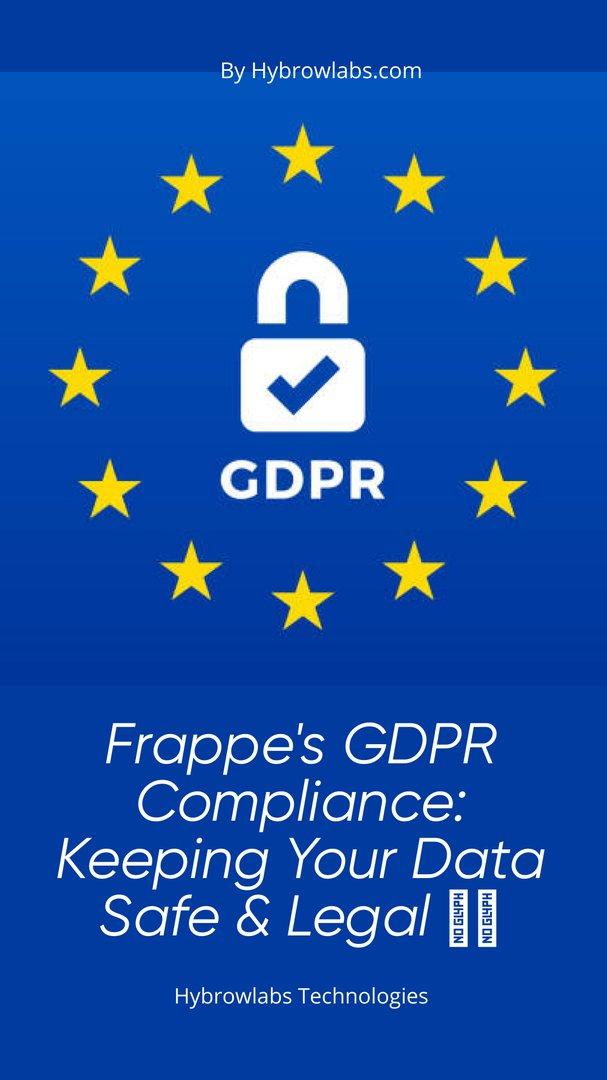
In today's digital world, web applications have become a vital part of our lives. However, with the increasing use of web applications, the risk of cyber-attacks has also increased. Cybercriminals use various tactics to manipulate vulnerabilities in web applications to acquire unauthorized access to sensitive information. Hence, it has become essential for businesses to implement strong security features in their web applications to protect against potential threats. Frappe, an open-source web application framework, offers various security features to protect your web applications from threats we will discuss that today.
Importance of securing web applications from threats:
Securing web applications from threats is essential for various reasons, including:
1. Protection of sensitive data:
Web applications often store sensitive data such as personal information, financial details, & intellectual property. If this information falls into the wrong hands, it can result in severe consequences such as identity theft, financial loss, & reputation damage. By securing web applications, businesses can protect this data from potential cyber-attacks.
2. Compliance with regulations:
Various regulations such as GDPR, HIPAA, & PCI-DSS require businesses to protect sensitive data from unauthorized access. Failure to comply with these regulations can result in legal penalties, fines, & reputational damage. Therefore, securing web applications is essential for businesses to comply with these regulations.
3. Prevention of downtime and data loss:
Cyber attacks such as Distributed Denial of Service (DDoS) attacks can result in downtime & data loss for businesses. This can cause significant financial losses, as businesses may lose revenue & customers during this time. Securing web applications can prevent these types of attacks from occurring, ensuring that the business remains operational & profitable.
4. Protection of customer trust:
Customers trust businesses with their personal information & expect that it will be protected from potential threats. If a business's web application is compromised, it can result in the loss of customer trust & loyalty. Securing web applications can confirm that customers' data is protected, thus maintaining their trust in the business.
5. Prevention of reputation damage:
Cyber attacks can cause significant reputational damage to businesses. If a business's web application is compromised, it can result in negative publicity & a damaged reputation. Securing web applications can prevent these types of attacks, thus maintaining the business's positive reputation.
How do Frappe's security features help protect your web applications?
Frappe offers a range of security features that work together to provide a secure environment for your web applications. Here is a detailed explanation of how Frappe's security features can protect your web applications:
1. Authentication and access control:
Frappe's authentication & access control mechanisms make sure that only authorized users can access the web application's resources. It supports multiple authentication methods, including username & password, two-factor authentication, & LDAP integration. The access control system enables administrators to grant specific permissions to users based on their roles, confirming that users can only access the resources they are authorized to access.
2. Encryption and data protection:
Frappe uses industry-standard encryption mechanisms such as HTTPS, SSL, & TLS to protect data in transit. It also provides encryption at rest to protect sensitive data stored in databases. Additionally, it supports data masking, which helps sensitive data to be hidden or obscured from unauthorized users.
3. Security updates and patches:
Frappe releases regular security updates & patches to address known vulnerabilities & protect against new threats. These updates can be easily installed through Frappe's built-in update mechanism, confirming that your web application remains secure & up-to-date.
4. Vulnerability scanning and penetration testing:
Frappe provides tools to perform vulnerability scanning & penetration testing on your web application. These tools can identify potential security vulnerabilities & allow you to address them before they are exploited by attackers.
5. Audit trail:
Frappe maintains an audit trail of all user actions, including changes made to data, login attempts, & system configurations. This audit trail can be used to detect & investigate security incidents.
Authentication and access control in Frappe:
Authentication and access control are essential security features for any web application. Frappe provides a robust authentication and access control system to make sure that only authorized users can access the resources & functionalities of the web application.
Frappe supports multiple authentication methods, including username and password, two-factor authentication, and LDAP integration. This allows administrators to choose the authentication method that best suits their security requirements. The two-factor authentication adds an extra layer of security by requiring users to provide a second factor, such as a code sent to their mobile phone or a biometric factor, in addition to their username and password.
Frappe's access control system is role-based, which means that permissions can be granted to users based on their roles. Roles can be defined based on the job functions of users or the level of access they require. For example, an administrator may have full access to all resources and functionalities, while a regular user may only have access to view and update certain data. Frappe also supports hierarchical role-based access control, which allows administrators to create parent and child roles. Child roles inherit the permissions of their parent roles, which simplifies the management of access control.
In addition to role-based access control, Frappe also provides fine-grained access control mechanisms. Administrators can set permissions for specific fields or sections of the web application based on the roles of the users. This ensures that users can only access the data they are authorized to access and prevents unauthorized access to sensitive information. Overall, Frappe's authentication and access control mechanisms provide a secure environment for web applications by assuring that only authorized users can access the resources & functionalities of the web application. By implementing these security features and following best practices, you can ensure that your web application remains protected from potential cyber-attacks.
Frappe's encryption and data protection mechanisms:
Frappe provides several encryption and data protection mechanisms to ensure that data is secure both in transit and at rest.
1. HTTPS, SSL, and TLS:
Frappe uses HTTPS, SSL, and TLS encryption protocols to secure data in transit. These protocols encrypt data as it travels between a user's browser and the server, making it difficult for attackers to intercept & access the data.
2. Encryption at rest:
Frappe supports encryption at rest to protect data stored in databases. This assure that even if an attacker gains access to the database, they will not be able to read or access the encrypted data.
3. Data masking:
Frappe provides data masking capabilities, which allow sensitive data to be hidden or obscured from unauthorized users. This assures that even if an attacker gains access to the data, they will not be able to read or access sensitive information.
4. Password hashing:
Frappe uses password hashing to secure user passwords. Password hashing converts plain text passwords into a scrambled format that cannot be reversed, making it difficult for attackers to obtain user passwords in the event of a security breach.
5. GDPR compliance:
Frappe is compliant with the European Union's General Data Protection Regulation (GDPR), which regulates the protection & managing of personal data. Frappe provides various features to assure compliance with GDPR, including data erasure & data export capabilities.
Frappe's vulnerability scanning and penetration testing capabilities:
To make sure the security of the applications built using Frappe, the framework provides advanced security features, including vulnerability scanning & penetration testing capabilities.
1. Vulnerability Scanning:
The vulnerability scanning tools built into Frappe are designed to identify and report on potential security vulnerabilities in the application's code. These tools check for common web application security issues, such as SQL injection, cross-site scripting, and file inclusion vulnerabilities. Additionally, vulnerability scanning tools can be scheduled to run automatically or manually, providing developers with a quick and easy way to assess the security posture of their applications.
2. Penetration Testing:
The penetration testing capabilities of Frappe allow developers and security professionals to simulate a real-world attack on the application, identifying potential vulnerabilities that may have been missed by other security testing tools. These capabilities help developers identify weaknesses in their application's defenses, allowing them to address potential security issues before they can be exploited by attackers.
Overall, Frappe's vulnerability scanning and penetration testing capabilities provide developers with the tools they need to ensure the security of their applications. By regularly testing and scanning applications built with Frappe, developers can identify and address potential security issues, reducing the risk of successful attacks and enhancing the overall security posture of their applications.
Conclusion-
In conclusion, Frappe's security features provide a solid foundation for protecting web applications, but it's up to developers and users to take additional steps to ensure the security of their systems and data. It's important to note that no security solution can protect against all threats. Developers and users must also take steps to ensure the security of their systems and data, including implementing strong password policies, regularly monitoring system logs for suspicious activity, and educating users on best security practices. Utilizing services like Hybrowlabs Development services can further support these efforts and help build secure web applications.
FAQ:
1. What security features does Frappe offer?
Frappe offers several security features, including role-based access control, encryption, authentication mechanisms, vulnerability scanning, and penetration testing capabilities.
2. How often does Frappe release security updates and patches?
Frappe releases security updates and patches on a regular basis to address known security vulnerabilities and fix bugs.
3. Can Frappe's security features be customized?
Yes, Frappe's security features can be customized and configured to meet the specific needs of the application being developed.
4. Is Frappe's security features sufficient to protect against all threats?
While Frappe's security features provide a solid foundation for protecting web applications, no security solution can protect against all threats. Developers and users must also take steps to ensure the security of their systems and data.
5. How often are security updates and patches released for Frappe?
Frappe releases security updates and patches on a regular basis to address known security vulnerabilities and fix bugs.









a3dc85.jpg)

.jpg)
fd8f11.png)

.jpg)
.jpg)